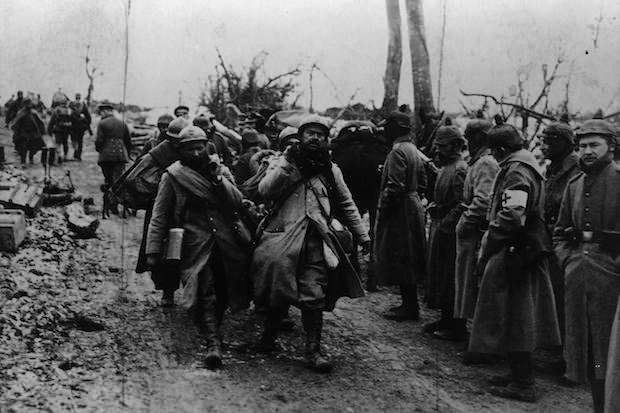From ‘Prisoners of War’, The Spectator, 13 March 1915:
Let us mention also a passage from Hume’s history quoted by Sir Graham Bower in an excellent letter to the Morning Post of Wednesday. Hume is describing the campaign of Edward III :—
“The French officers who had fallen into the hands of the English were conducted into Calais, where Edward discovered to them the antagonist with whom they had had the honour tabs engaged, and treated them with great regard and courtesy. They were admitted to sup with the Prince of Wales and the English nobility, and after supper the King himself came into the apartment and went about conversing familiarly?’
We fear that some Englishmen are falling into such a frame of mind that if Edward III reappeared and acted in the same way today he would be told that he was a traitor or a spy, instead of one of the greatest of English soldiers. Let us stun our enemy in the field with giant blows; let us if necessary annihilate him by shells and bullets and bombs, and every kind of new explosive we can invent. But let us not come down to the expedient of “taking it out” of prisoners who are in our hands and at our mercy.
In conclusion, we must say a word about the Admiralty announcement as to the treatment of the crews of the German submarines who have been taken prisoners. It is a difficult question, for we admit that it is necessary to mark our reprobation of the criminal errands which the German Government have sent their submarines out to perform. But after all the officers and men of these engines of assassination are only doing what they are ordered to do. Not one of us in the position of a Lieutenant commanding a submarine would disobey the orders of his superiors. It is the German superiors who are the real criminals. It is the men who have invented a diabolical method of warfare and require their subordinates to carry it out who must, if possible, be brought to justice and shame. The wretched instruments of the policy are not the men on whom to visit our wrath. Those Germans who are ashamed of their policy—and we fancy there must in secret be many— will grow more ashamed if we offer them the continuous spectacle of a startling contrast. It may be, and indeed we think it is, the fact that the Admiralty announcement means only that the prisoners from submarines are not to be treated with marked consideration, but that their comfort and well-being, according to all the usual customs, are to be ensured. If that is so, we have no objection to make. But the announcement was not very happily worded, and the misgivings it has aroused in many minds are, we are glad to think, a measure of the jealousy with which the typical Englishman watches the whole question of the treatment of prisoners. If we were asked exactly in what spirit the prisoners from the submarines ought to be treated, we think we should say : “Treat them thoroughly well. But you needn’t ask them to lunch.”






Comments